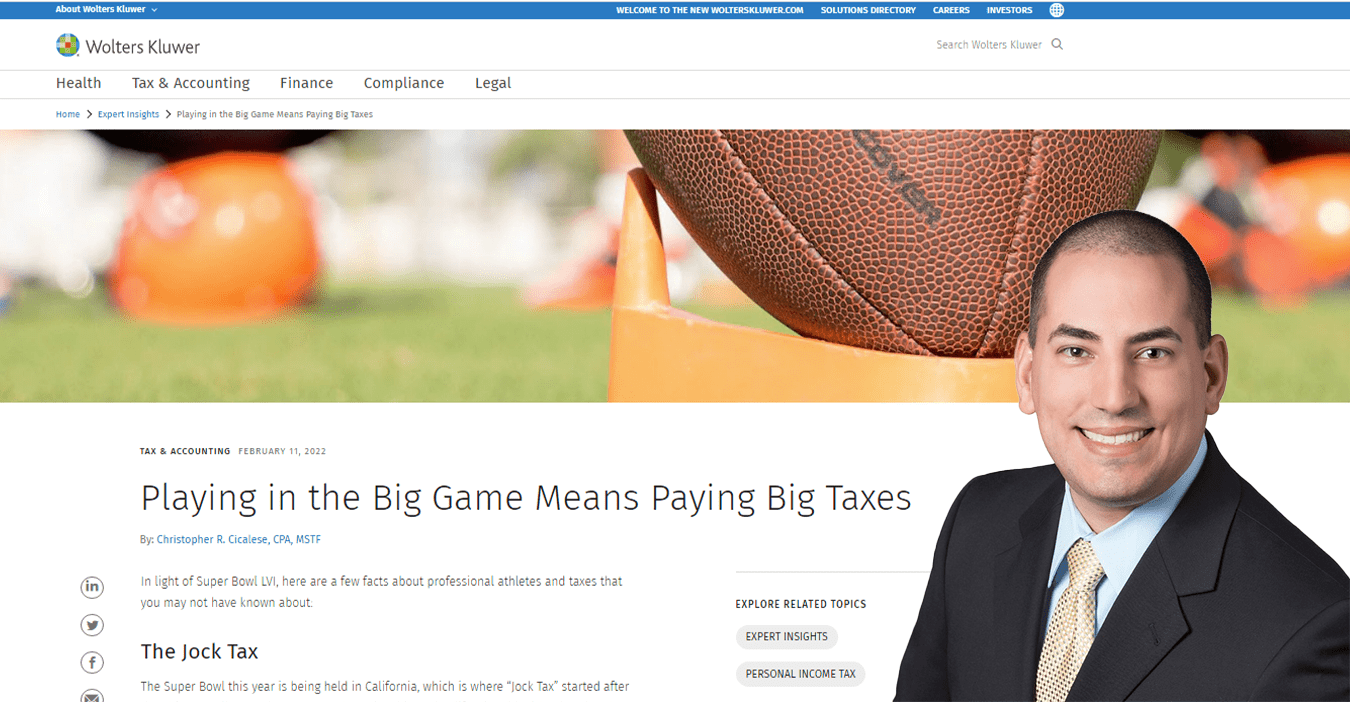February 16, 2022


Associate Partner Chris Cicalese, CPA, MSTFP was interviewed by Wolters Kluwer regarding the impact of taxes when it comes to the Super Bowl and professional athletes. He comments in the article, “Playing in the Big Game Means Paying Big Taxes,” discussing the way that professional athletes and those living in the surrounding area may be affected by the Super Bowl through their taxes.
Following are some highlights from the published article:
The Jock Tax
The Super Bowl this year is being held in California, which is where “Jock Tax” started. […]
The Downfalls of Fame
All taxpayers are expected to pay tax in states when they cross state lines to do business. However, unlike professional athletes, their travel and earnings are not posted all over the web for an auditor to look up.
The amount of income that is subject to tax is based off the duty day calculation to get a ratio of total days working during the year versus working in the state. This ratio is then multiplied by the player’s calendar year income to get the state allocation. In some cases, if a player’s calendar year income is significantly large, but they earned a small amount of money for the one game or tournament, they could actually end up paying more in tax to that state than they earned while playing there.
How Much do The Super Bowl Winners Actually Make?
At the Super Bowl, each Player on the Winning team receives $150,000 while each player on the losing team receives $75,000. Using the duty day calculation, if you assume players will have roughly 200 duty days in the 2022 tax year and would not play in California again you would apportion 3.5% (7 days for Super Bowl Week of the 200 total days) of their total income to California, which would get taxed at their applicable rates.
In the case of a player who earns $5,000,000 during 2022, on top of winning the Super Bowl, the player would pay approximately $23,975 in state taxes on the $150,000 bonus, giving them an effective state tax rate of 15.98% when their tax bracket is only 13.3%. Players will also pay federal tax at the 37%.
Yes, You Have to Pay Tax on That
For the MVP of the Super Bowl, in addition to the normal trophy and bonuses they might get, any vehicle or trips they receive would be considered taxable income. […]
The Augusta Rule
Events that many people travel to like the Super Bowl offer a rare opportunity for some tax-free income for homeowners in the area. Under IRC §280A(g), if a home is rented for less than 15 days during the taxable year the income is not included in gross income nor can the expenses for that period be deducted. Anyone that lives in the area around the Super Bowl could potentially get some extra income in their pocket that Uncle Sam won’t tax.
Follow Wolters Kluwer on Twitter @Wolters_Kluwer for more health, tax, accounting, finance, and legal sectors news and updates.